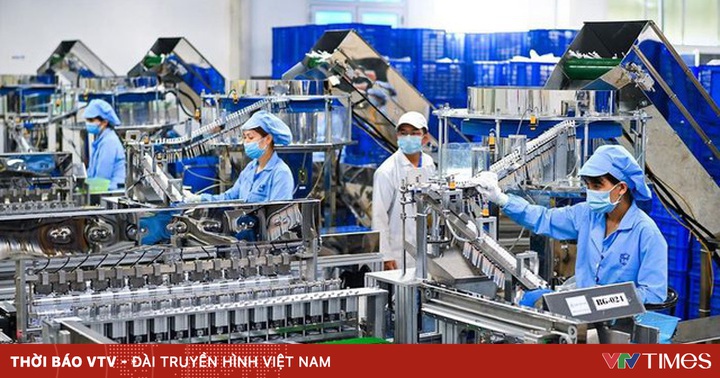HSBC: 6 trends shaping Vietnam’s future
Climate Change is the first trend that HSBC mentioned. According to this bank, Vietnam, a country with a long coastline with a population of nearly 100 million people and one of the largest rice exporters in the world, the prospect of sea level rise and crop failure when Earth Warming is a threat to the well-being and prosperity of society. The Asian region, especially the Mekong Delta region, is currently at the forefront of climate change.
“Without strong action, by 2050, Asia could face the risk of GDP loss from $2.8 trillion to $4.7 trillion, accounting for more than two-thirds of the global GDP loss. due to the impact of climate change”, HSBC warned.

According to HSBC, climate change is a challenge but also brings many opportunities for the Vietnamese economy
Besides challenges, HSBC believes that climate change also brings great opportunities for Vietnam. With climate change, industries such as information technology, biomedicine, new materials and new energy are becoming new, more sustainable drivers of economic growth.
“Vietnam will need to make more efforts to reduce dependence on coal as a source of electricity generation and export. Coal power currently accounts for about one-third of the country’s electricity production,” HSBC said.
Digitizing This is the second trend that HSBC believes Vietnam needs to be ahead of.
The pandemic has accelerated the transition to an uninterrupted digital society and stimulated changes in consumer behaviour. These changes are not only temporary, but are more likely to have lasting effects.
The wave of digital transformation will continue to drive the level of technology application in industries, especially: telecommuting, healthcare, education, entertainment and financial services, in addition to reducing transaction costs. , support participation in global value chains and improve market entry and access.

According to HSBC, the digital revolution allows countries like Vietnam to compete with more advanced economies (Artwork).
HSBC believes that one of the big effects of the digital revolution is leveling the playing field globally, allowing countries like Vietnam to compete with more advanced economies.
“Enterprises like VNG, MoMo and VNPay, Vietnam’s unicorns, are all able to compete in the international arena. If we are to extend that chain of success, Vietnam needs to continue to invest in education. and accessibility to build a thriving digital ecosystem to drive innovation,” recommends HSBC.
Vaccination equality This is the next trend mentioned by HSBC, while emphasizing that Vietnam is a shining example in this regard.
“COVID-19 is a reminder that the pandemic spares no one. Only when every country and every community gets a vaccine equally quickly and fully can we return to normal life and achieve a global economic recovery,” HSBC said.
A report by the Economist Intelligence Unit (EIU) found that rich countries have deployed a vaccine against the coronavirus 100 times more than poor countries. The price to pay for the delay in the worldwide rollout of vaccination is very high.
The report forecasts that countries that have not reached 60% of their population immunized by mid-2022 will experience a GDP loss of about $2.3 billion by 2025. Emerging economies will bear two-thirds of the total loss. This further widens the economic disparity with advanced economies.
With Vietnam, nearly 80% of the population has been vaccinated with at least two doses of COVID-19 vaccine, one of the countries with the highest vaccine coverage rate in the world. According to HSBC, this is an important achievement for Vietnam if considering the context of 12 months ago.
Commerce As the fourth trend mentioned by HSBC, the bank emphasizes that commercial activities are still the shortest and most direct way to achieve economic growth.
Up to now, Vietnam has joined 15 free trade agreements (FTAs) of which the most recent is the Regional Comprehensive Economic Partnership (RCEP) which has officially come into effect since the beginning of this year.

HSBC rates Vietnam as one of the most open economies in the world (Artwork)
HSBC believes that trade agreements will open up many opportunities for Vietnamese businesses and come with challenges because the country will need to carry out more domestic reforms to maintain its competitive position. . Besides, Vietnam needs to continue to cooperate with other Asian countries to facilitate investment flows in the region as well as remove non-tax barriers so that the whole region can develop. maximize commercial potential.
Political geography is the next trend that HSBC mentioned. According to HSBC, Russia-Ukraine tensions and geopolitical tensions in other parts of the world will continue to create unwanted uncertainties in the global economy.
In the context of international turmoil, Vietnam’s open attitude and consistent stance on settling international disputes by peaceful means on the basis of international law is a respectable opinion. .
“The success story of every economy, especially in Asia, is written on the material of interconnected relationships. The foundation for the region’s shared prosperity is a spirit of cooperation for mutual success. . Any efforts or actions that deviate from this spirit will inevitably lead to a decline in the economic and social well-being of the entire region,” HSBC said.
Inequality and inclusive recovery This is the final trend that HSBC thinks will define the future of Vietnam.
HSBC cites data from the Asian Development Bank (ADB) estimating that the pandemic has plunged about 75-80 million people in Asia since 2020.
Progress in hunger eradication, health care and education has also been halted, despite significant progress made across the region in the past, although the results have not been uniform.
HSBC believes that it is necessary to quickly recognize and address the significant impacts of COVID-19 on poverty and inequality. The urgent issue now is that low-income developing countries need vaccines and the support they need to recover.
“This is also an opportunity to build community resilience to mitigate the impact of natural disasters as well as prevent other crises in the future,” HSBC emphasized.
* Invite readers to watch programs broadcast by Vietnam Television on TV Online and VTVGo!
at Blogtuan.info – Source: vtv.vn – Read the original article here



![[INFOGRAPHIC] Employees work no more than 300 hours/year and 60 hours/month 4 [INFOGRAPHIC] Employees work no more than 300 hours/year and 60 hours/month](https://vtv1.mediacdn.vn/fb_thumb_bn/2022/3/25/dn010321-1648199641932100472461.jpg)